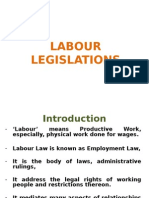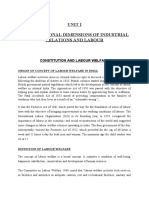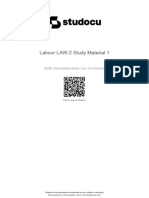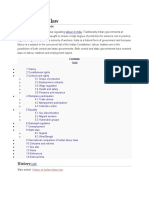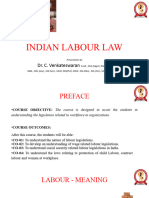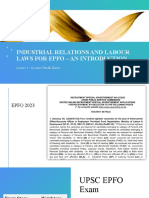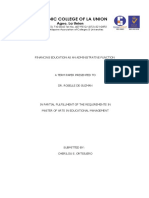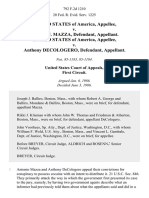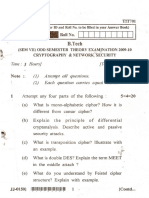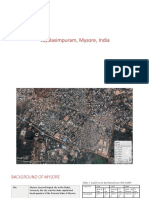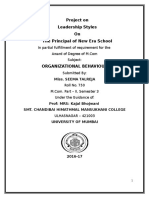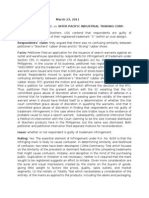LABOUR LAWS
Vidyadhar S. Apte
ADVOCATE
� SYLLABUS
• Introduction to Labour Laws
• The Factories Act, 1948
• The Industrial Disputes Act, 1947
• The Industrial Employment (SO) Act, 1946
• The Contract Labour (Regulation & Abolition
Act)
• The Trade Union Act, 1926
• The Employee’s Compensation Act, 1923
• The Employee State Insurance Act, 1948
• PF, Bonus, Gratuity, Maternity benefits
provisions
� INTRODUCTION
• Labour policy and legislation;
• Safety, health and welfare of labour
• Social security of labour
• Policy relating to special target groups such as women and child
labour
• Industrial relations and enforcement of labour laws in the central
sphere
• Adjudication of industrial disputes through Central Government
Industrial Tribunals-cum-Labour Courts and National Industrial
Tribunals
• Workers’ education
• Labour and employment statistics
• Emigration of labour for employment abroad
• Employment services and vocational training
• Administration of central labour and employment services
• International cooperation in labour and employment matters
� CONSTITUTIONAL PROVISIONS
• The Fundamental Rights and Directive Principles of State
Policy enshrined in Part III and Part IV mentions working class
related benchmark laws.
• Part III (Article 12 to 35)
• fundamental rights of its citizens which includes Equality
before the law, Religion, Sex, caste, place of birth, the
abolition of untouchability, freedom of speech and expression
and prohibition of employment of children in factories
• Article 14
• Equality before the law which is interpreted in labour laws as
“Equal pay for Equal work”. It does not mean that article 14 is
absolute. There are a few exceptions in it regarding labour
laws such as physical ability, unskilled and skilled labours shall
receive payment according to their merit.
� CONSTITUTIONAL PROVISIONS
• In the case of Randhir Singh vs Union of India, the Supreme
Court said that “Even though the principle of ‘Equal pay for
Equal work’ is not defined in the Constitution of India, it is a
goal which is to be achieved through Article 14,16 and 39 of
the Constitution of India.
• Article 19 (1) (C)
• Constitution guarantees citizens to form a union or
association. The Trade Union Act, 1926 works through this
Article of the Constitution. It allows workers to form trade
unions.
• Trade Unions provide the power to raise voice against
atrocities done to the workers. Unionization brings power to
the labourers. Trade Unions discuss various labour-related
problems with the employers, they conduct strikes, etc.
� CONSTITUTIONAL PROVISIONS
• Article 23
• Constitution prohibits forced labour. In current times, forced
or bonded labour is an offense which is punishable under the
law. The Bonded Labour (Abolition) Act, 1976 prohibits all
kinds of bonded labour and is declared illegal.
• Article 24
• Constitution prohibits all forms of child labour. Nobody can
employ a child under the age of 14 to work.
� CONSTITUTIONAL PROVISIONS
• Part IV (Article 36 – 51)
• “Directive Principles of State Policy” aims to work toward the
welfare of its citizens. DPSP cannot be enforced in the court of
law, but it provides a guideline to the legislature for
making labour laws in India.
• Article 39 (a)
• “The State shall, in particular, direct its policy towards
securing; That the citizens, men and women equally, have the
right to an adequate means of livelihood. It means that every
citizen of the country has the right to earn a livelihood
without getting discriminated on the basis of their sex.
• Article 39 (d)
• there is equal pay for equal work for both men and women.
Wages will not be determined on the basis of sex rather it will
be according to the amount of work done by the worker.
� CONSTITUTIONAL PROVISIONS
• Article 41
• “ Right to Work” which means that every citizen of the
country has the right to work and the state with the best of its
abilities will secure the right to work and education.
• Article 42
• Provides for the upliftment of the working conditions for
workers. It talks about creating a suitable and Humane
workplace. This article also talks about maternity relief, i.e
leave provided to women when they are pregnant.
• Article 43
• “living wage” for its citizens. Living wage not only includes the
“bare necessities of life” but also the social and cultural
upliftment of the person. It also includes education and
insurances for a person.
� CONSTITUTIONAL PROVISIONS
• Conclusion
• Constitution of India is the base for all laws in our
country. The labour laws are also made according to
the constitution and any violation of constitutional
laws result in the abolition of that particular law. The
Directive Principles of the State policy play a major
role in the making of new labour laws in India.
� LABOUR LEGISLATION CLASSIFICATION
• Laws relating to Industrial Relations-
1. Industrial Disputes Act, 1947
2. Trade Unions Act, 1926
• Laws relating to Wages
1. Minimum Wages Act, 1948
2. Payment of Wages Act, 1936
3. Payment of Bonus Act, 1965
• Laws relating to Social Security
1. Employees’ Provident Funds and Miscellaneous
Provisions Act, 1952
2. Employees’ State Insurance Act, 1948
3. Labour Welfare Fund Act (of respective States)
4. Payment of Gratuity Act, 1972
5. Employee’s Compensation Act, 1923
� LABOUR LEGISLATION CLASSIFICATION
• Laws relating to Working Hours, Conditions of Services and
Employment
1. Factories Act, 1948
2. Industrial Employment (Standing Orders) Act, 1946
3. Shops and Commercial Establishments Act (of respective
States)
4. Contract Labour (Regulation and Abolition) Act, 1970
5. Inter-State Migrant Workmen (Regulation of Employment
and Conditions of Service) Act, 1979
6. Weekly Holiday Act, 1942
7. National and Festival Holidays Act (of respective States)
1963
8. The Plantation Labour Act, 1951
9. The Mines Act, 1952
10. The Dock Workers (Safety, Health & Welfare) Act, 1986
� LABOUR LEGISLATION CLASSIFICATION
• Laws relating to Equality and Empowerment of Women
1. Equal Remuneration Act, 1976
2. Maternity Benefits Act, 1961
• Prohibitive Labour Laws
1. Bonded Labour System (Abolition), Act, 1976
2. Child Labour (Prohibition & Regulation) Act, 1986
3. The Beedi and Cigar Workers (Conditions of
Employment) Act, 1966
4. The Sexual Harassment at the Workplace (Prevention,
Prohibition and Redressal) Act, 2013
• Laws relating to Employment and Training
1. Apprentices Act, 1961
2. Employment Exchanges (Compulsory Notification of
Vacancies) Act, 1959






